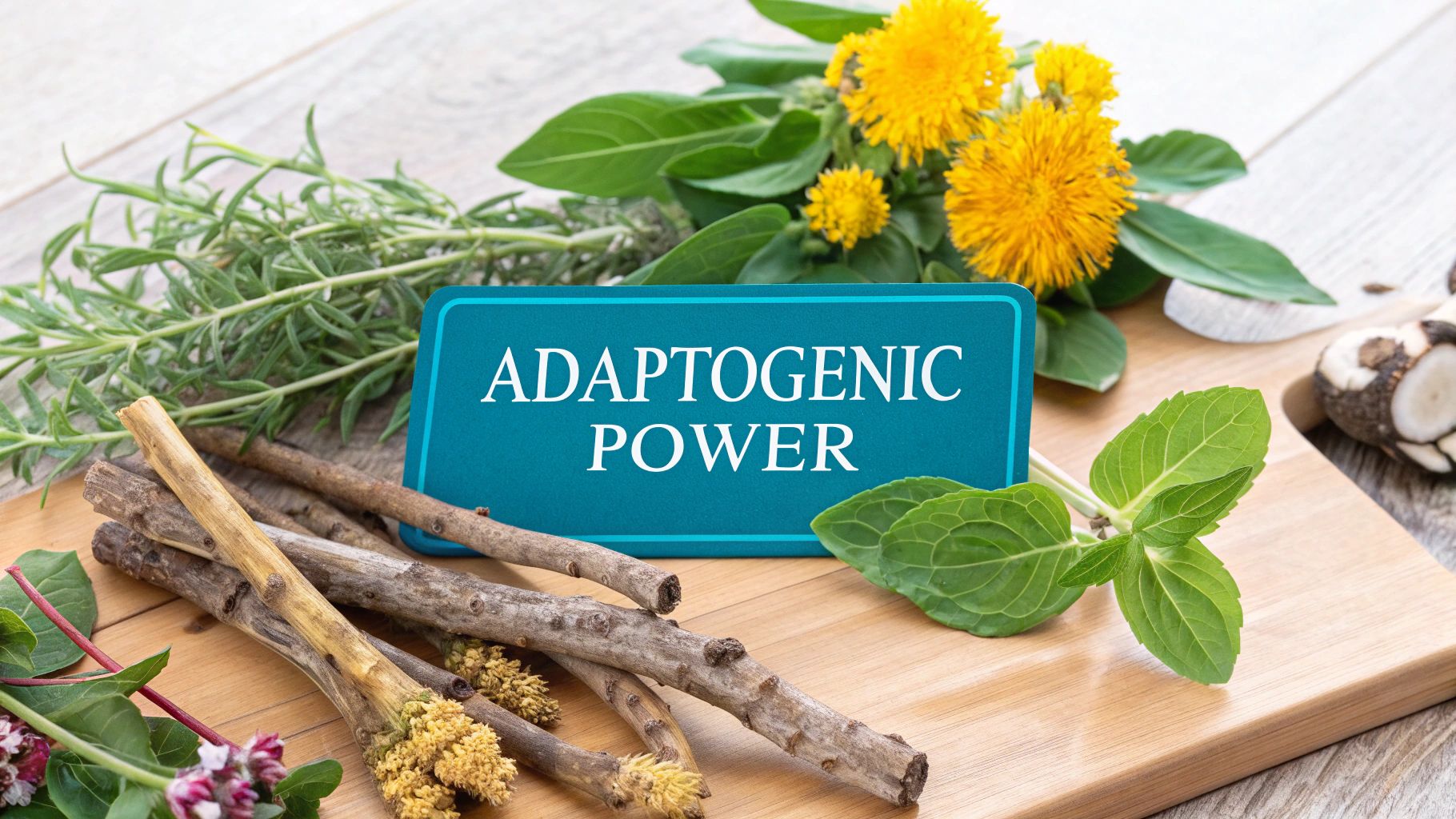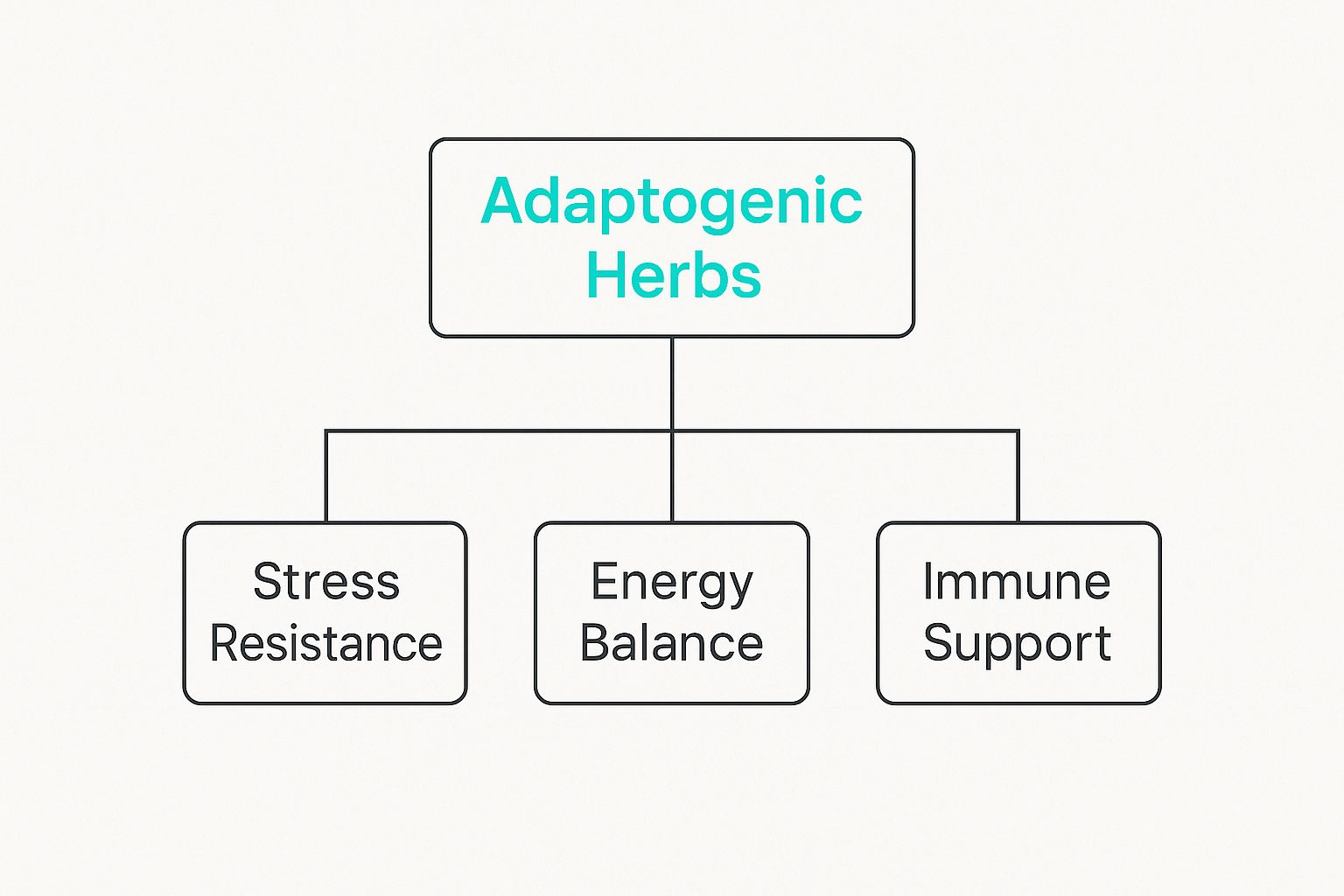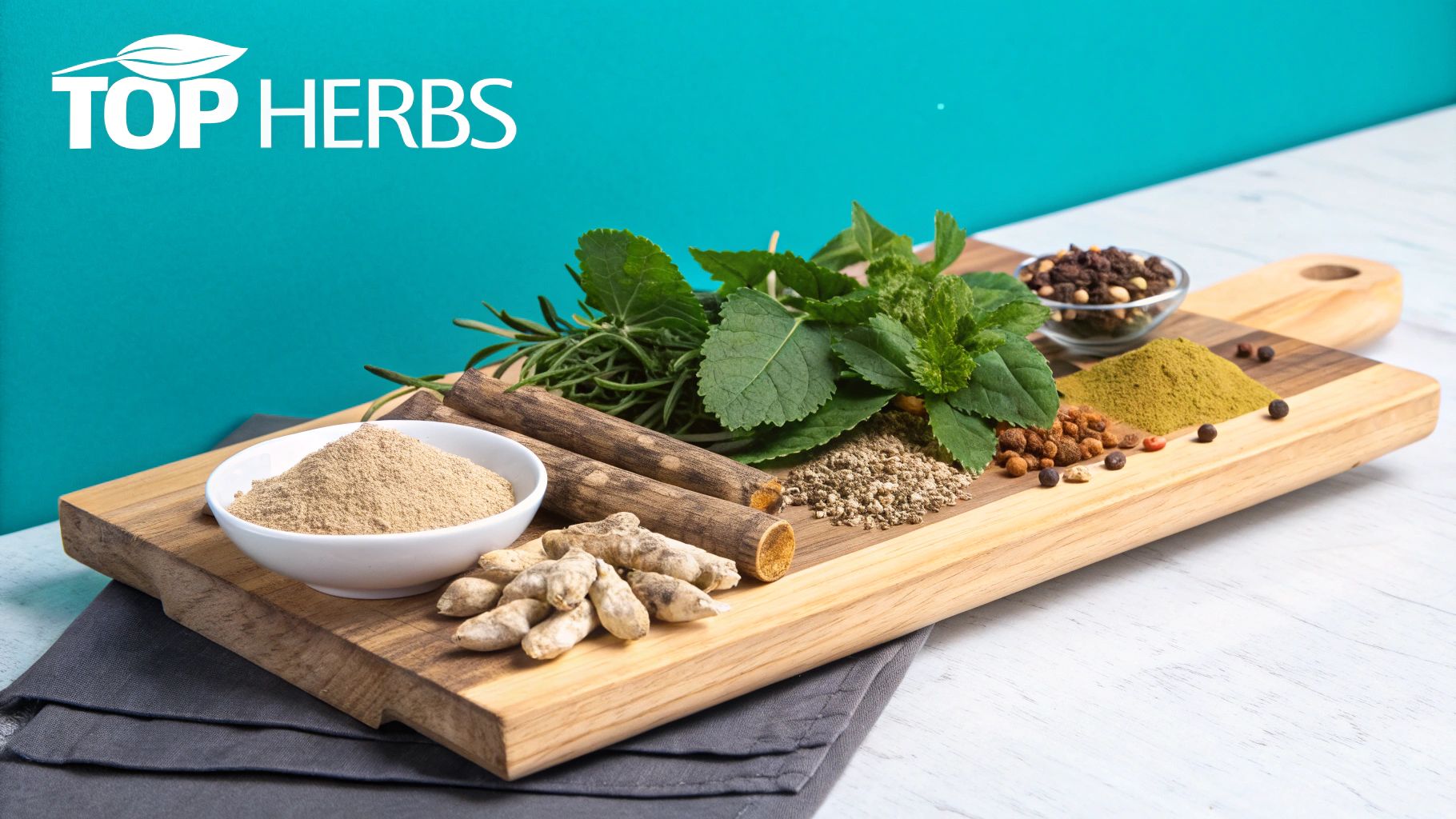

· By Annemarie
What Are Adaptogenic Herbs? Discover Their Stress-Relieving Power
Adaptogenic herbs are a pretty special class of plants. At their core, they help your body build resilience against all sorts of stressors—whether they’re physical, chemical, or biological. Think of them as a master regulator for your internal systems, helping you adapt and find balance without acting like a stimulant or a sedative.
Understanding Adaptogenic Herbs
Let’s use an analogy. Imagine your body has an internal stress thermostat. When you’re up against a big project at work, a killer workout, or even a long night out with friends, that thermostat can get cranked up and stuck on high. The result? You feel totally drained, frazzled, and on edge. This is where getting what adaptogens are all about really clicks. They don’t just slap a band-aid on the symptoms; they work to recalibrate that thermostat.
You can also think of them as a personal trainer for your stress response system. Unlike caffeine that gives you an artificial jolt or a sedative that forces you to relax, adaptogens help your body get stronger and better at managing stress all on its own. It’s all about creating a state of balanced resilience, so you can handle whatever life throws your way more effectively.
The Three Defining Criteria of an Adaptogen
Now, not just any old herb gets to be called an "adaptogen." For a plant to earn this prestigious title, it has to meet three specific criteria laid out by decades of scientific research. These rules are what separate true adaptogens from other generally beneficial herbs.
Here’s a quick breakdown of what makes an adaptogen, an adaptogen.
| Criterion | What It Means for You | Simple Analogy |
|---|---|---|
| Non-Specific Defense | It helps your body stand up to a wide range of stressors—physical, emotional, or environmental—not just one single thing. | It’s like an all-weather jacket, protecting you from wind, rain, and cold, not just one element. |
| Normalizing Effect | It works to bring your body back into balance (what scientists call homeostasis), either by calming an overactive system or boosting a depleted one. | Think of it as a smart thermostat for your body, turning the heat up or the A/C on depending on what’s needed to stay comfortable. |
| Non-Toxicity | It must be safe to take over long periods without causing major side effects or messing with your body’s normal functions. | It's like a healthy food you can eat every day. It nourishes you without causing harm. |
These three pillars ensure that when you take an adaptogen, you're getting a safe, balancing, and broadly protective benefit.
This visual helps simplify how these amazing herbs support your overall well-being from multiple angles.

As you can see, adaptogens sit right at the top, directly influencing your stress resistance, energy levels, and immune function to help create a foundation of solid health.
At their core, adaptogens are intelligent by nature. They don't force a specific action; instead, they provide your body with the resources it needs to self-correct, promoting stability from within.
Their real magic isn’t in being a quick fix, but in being a long-term ally for your body. By consistently supporting your body's ability to adapt, these incredible herbs help you build a stronger foundation for lasting wellness in a world that’s full of constant demands.
The Modern Stress Crisis and Your Body's Response

Let's be honest, modern life can feel like you're constantly running on a hamster wheel. Between endless work pings and the pressure to keep up a social life, the demands on our energy are relentless. This isn't just in your head—it’s a physical reality that puts your internal systems into a state of high alert.
Think of your body’s stress response system—the hypothalamic-pituitary-adrenal (HPA) axis—like a super-sensitive smoke alarm. A little bit of stress, say from a looming deadline or a tough workout, sets off the alarm. Your body then pumps out cortisol, the main stress hormone, giving you that jolt of focus and energy to deal with whatever’s in front of you. Once the "fire" is out, the alarm is supposed to shut off.
The problem is, in our world, the smoke never really seems to clear.
When the Alarm Never Turns Off
That constant, low-level stress from your job, social plans, or even just a late night out keeps that HPA axis alarm blaring. Instead of getting those useful, short bursts of cortisol, your body is swimming in it for long stretches. This is what leads to that all-too-familiar feeling of being completely maxed out.
When your stress response is always on, your body starts to pay the price. Instead of feeling sharp and ready, you're left feeling perpetually on edge and utterly exhausted, a state sometimes referred to as "adrenal fatigue."
This just isn't a sustainable way to live. Your body simply wasn't built for this kind of stress marathon. It slowly drains your resources, which can kick off a whole host of issues that mess with your day-to-day well-being.
The Downstream Effects of Chronic Stress
When your internal system is constantly overtaxed, the effects ripple through your whole body. We're not just talking about feeling mentally fried; the physical toll is real and can get in the way of your life in some very noticeable ways.
You might start to experience:
- Constant Fatigue: That feeling of being tired even after a full night's sleep, because your energy tank is just empty.
- Brain Fog: Having a hard time concentrating or feeling like you’re a step behind mentally.
- Weakened Immunity: Noticing that you're catching every little bug that goes around as stress messes with your immune system.
- Mood Imbalances: Feeling more anxious or irritable than usual as your nervous system gets stuck in "fight-or-flight" mode.
This is exactly where the conversation about what adaptogenic herbs are becomes so important. They don't just put a band-aid on the symptoms. Adaptogens work deeper, helping your body get a handle on its reaction to all this non-stop stress. They offer a way to help that internal "smoke alarm" finally find its off switch, bringing back some balance so your system can rest and recover.
Meet the Most Popular Adaptogenic Herbs

Alright, now that you know how adaptogens act like your body's personal stress managers, let's meet some of the most celebrated members of the family. Each one brings its own unique personality and skill set to the table, making them better suited for different wellness goals.
The buzz around these herbs isn't just a fleeting trend. It’s tied to a massive consumer shift toward natural health solutions. The global market for adaptogens is already sitting at around $8.96 billion and is expected to hit $12.35 billion soon. This boom is all about people wanting clean, chemical-free products to support their overall well-being. If you want to dive deeper into the numbers, check out the full insights from Future Market Insights.
Getting to know the big players can help you pick the right ally for what you need—whether that’s calming a racing mind, getting an energy kick, or sharpening your focus.
Ashwagandha: The Calming Anchor
Ashwagandha (Withania somnifera) is basically the superstar of the adaptogen world, holding a massive 26% share of the entire market. It has deep roots in India's ancient Ayurvedic medicine, where it’s often called the "King of Ayurvedic Herbs." We're talking over 3,000 years of use, prized for its power to restore vitality and promote longevity.
Today, Ashwagandha is famous for its powerful calming effects. Think of it as a grounding force for a nervous system that’s gone haywire. It mainly works by helping to bring down your cortisol levels—that's the primary stress hormone that leaves you feeling both wired and exhausted when it's constantly running high.
If you feel like you're always on edge or your stress response is stuck in overdrive, Ashwagandha is the adaptogen that gently helps your body find the off-switch.
It's especially great for:
- Reducing Stress and Anxiety: Its biggest strength is creating a sense of calm and quiet without making most people drowsy.
- Improving Sleep Quality: By chilling out your mind before bed, it can help you get deeper, more restorative sleep.
- Supporting Overall Resilience: It helps strengthen your body’s natural defenses against the daily grind of chronic stress.
Rhodiola Rosea: The Energy Booster
If Ashwagandha is the calm anchor, then Rhodiola rosea is the get-up-and-go motivator. This tough little plant comes from the cold, mountainous parts of Europe and Asia. Legend has it that Vikings used it to boost their endurance and fight off fatigue during those long, brutal journeys.
Rhodiola’s modern-day superpower is firing up your energy and mental clarity, especially when you're under pressure. But unlike caffeine that gives you a sharp jolt followed by a crash, Rhodiola offers a more sustained, jitter-free lift. It actually helps your body produce energy at a cellular level, leaving you feeling more awake and focused.
This makes it a fantastic choice for anyone who needs to stay sharp and productive while battling both physical exhaustion and that dreaded mental fog.
Holy Basil (Tulsi): The Mind Balancer
In India, Holy Basil, or Tulsi, is hailed as "The Queen of Herbs" and is a sacred plant in the Ayurvedic tradition. You’ll often find it growing in and around homes and temples for its purifying and protective vibes.
Its adaptogenic magic lies in its incredible ability to bring a sense of balance to both mind and body. Holy Basil helps you handle stress with a clear, centered headspace. It's less about sedating you and more about creating a feeling of mental harmony.
You might want to reach for Holy Basil if you're looking to:
- Promote Mental Clarity: It helps cut through mental clutter and supports a calm, focused state.
- Elevate Your Mood: It's often used to cultivate a sense of well-being and emotional equilibrium.
- Support Immune Health: Like a lot of adaptogens, it also packs properties that support a healthy immune system.
Picking the right adaptogen is a totally personal journey. By matching your goals—whether it’s calm, energy, or balance—with the unique strengths of these herbs, you can find a natural partner to help you feel your best.
So, what does all this fascinating science actually do for you? Let's get past the theory and into the real-world results you can expect when you bring adaptogenic herbs into your routine. These plants aren't just a wellness trend; they offer tangible, noticeable improvements that help you feel more resilient, energized, and clear-headed.
One of the biggest draws is a very real reduction in that feeling of being constantly stressed and overwhelmed. Herbs like Ashwagandha, for example, have been studied extensively for their ability to lower cortisol levels. What that feels like is a calmer nervous system, helping you handle high-pressure days without feeling completely frazzled.
It’s not about feeling sedated or numb—it’s about feeling more in control. This powerful effect is a huge reason why the global adaptogen market is booming.
More Energy and Sharper Focus
So many of us reach for adaptogens to get a clean, sustainable energy lift. Unlike your morning coffee, which can often bring on jitters and an afternoon crash, herbs like Rhodiola Rosea work on a different level. They help your body produce energy more efficiently right down in your cells, which boosts your stamina and fights off fatigue without that over-caffeinated buzz.
This leads directly to another major benefit: better mental clarity. When your body isn't burning all its energy just trying to manage stress, your brain gets to reap the rewards.
By balancing your body's stress response, adaptogens free up mental energy. This often results in better focus, sharper memory, and an overall feeling of being more "switched on" and productive throughout the day.
For anyone juggling a packed schedule, that combination of physical energy and mental sharpness is a complete game-changer.
A Stronger Immune System
Finally, adaptogens are fantastic for building up a strong immune system. It's no secret that chronic stress wears down your body's defenses, leaving you more likely to catch whatever is going around. By helping to regulate that stress response, adaptogens give your immunity an indirect but powerful boost.
This helps build a stronger foundation for your overall health, allowing your body to protect itself more effectively. Some adaptogens also support liver function, which is a powerhouse organ for detoxification and keeping your whole system healthy. For anyone curious about that connection, you can learn more about how to boost your liver health with milk thistle in our other guide.
This growing awareness of all these benefits is what's fueling some serious market growth. In fact, one report from Data Bridge Market Research predicts the adaptogen market will jump from USD 13.70 billion to USD 23.19 billion. That growth is being driven by their inclusion in everything from food and drinks to pharmaceuticals and skincare. It just goes to show how versatile and impactful these incredible herbs can be for your health.
How to Safely Add Adaptogens to Your Routine
 So, you're ready to see what adaptogens can do for you? Good call. Bringing these powerhouse herbs into your daily life is actually pretty simple once you know the ropes. They come in all sorts of forms, which makes it easy to find a perfect match for your lifestyle.
So, you're ready to see what adaptogens can do for you? Good call. Bringing these powerhouse herbs into your daily life is actually pretty simple once you know the ropes. They come in all sorts of forms, which makes it easy to find a perfect match for your lifestyle.
You can find them as powders, capsules, tinctures, and even teas. Powders are awesome for tossing into your morning smoothie, while capsules are a no-brainer for a quick, measured dose. Tinctures get to work fast, and a good adaptogenic tea can be a really calming, ritualistic way to wind down and soak up the benefits.
It’s no surprise that these natural helpers are blowing up. The global adaptogens market was recently valued at USD 10.93 billion, and it's on track to climb even higher. This isn't just a fad; it's a real shift in how we think about wellness, especially in North America where hectic lifestyles have people searching for functional foods and supplements that actually work.
Smart Supplement Shopping
When you're browsing for a supplement, the label is your best friend. Quality is everything here, so look for products that get specific about what part of the plant is used (like the root or leaf) and mention standardization. This is just a fancy way of saying you're getting a consistent, effective dose of the active stuff in every bottle.
Also, keep an eye out for third-party certifications like USDA Organic or Non-GMO Project Verified. Seeing these seals means the product has passed some pretty strict tests for purity and quality. It’s a little extra peace of mind.
Your top priority should always be safety and effectiveness. A good supplement company won't hide anything; they'll be upfront about their ingredients, where they come from, and how they test their products.
Best Practices for Safe Use
Before you start anything new, it's always smart to have a quick chat with your doctor or another healthcare professional. This is especially true if you have any existing health conditions or are taking other medications. They can give you personalized advice to make sure it's the right move for you.
Since many adaptogens work hand-in-hand with your body's natural detox systems, you might also find it helpful to check out our guide on five proven tips to support liver function.
For a smooth and safe experience, keep these tips in mind:
- Start Low and Go Slow: Begin with the smallest recommended dose. This lets you see how your body feels before you think about increasing it.
- Try 'Cycling' Your Herbs: A lot of experts recommend taking an adaptogen for a certain amount of time, like six weeks, and then taking a short break for a week. This little trick can help keep the herb working effectively for the long haul.
- Listen to Your Body: This is the most important one. Pay close attention to how you feel. Adaptogens are meant to help you feel more balanced and resilient, so if something seems off, it's time to take a break or check in with your doctor.
Common Questions About Adaptogenic Herbs
As you start exploring what adaptogenic herbs are all about, it's completely normal for questions to pop up. Getting straight, practical answers is the best way to feel good about adding them to your wellness routine. Let’s tackle some of the most common ones.
How Long Until I Notice a Difference?
This is probably the number one question people ask, and it’s super important to set the right expectations. Unlike a pain reliever or a cup of coffee that gives you an immediate, obvious jolt, adaptogens work in a much more subtle way. Think of them less like a quick fix and more like a long-term training program for your body's stress response system.
They don't force a specific reaction; they gently guide your body toward building resilience over time. Most people start to feel a more balanced, even-keeled state after consistently taking an adaptogen for several weeks, sometimes even up to a month or two. Patience is everything—the real goal is lasting balance, not a temporary buzz.
Can I Take More Than One Adaptogen at Once?
Yes, you absolutely can. This practice is often called "stacking," and you'll see it in a lot of herbal formulas that combine different adaptogens. The idea is to create a synergistic effect, where the herbs work better together to give you broader support. That said, it’s smart to be mindful about it.
If you're just starting out with adaptogens, your best bet is to begin with a single herb. This gives you a chance to really understand how it works with your unique body chemistry. Once you get a feel for how you respond to one, you can then think about adding another that offers a complementary benefit.
A great way to start is by focusing on your main goal. Are you looking for calming energy, or do you need a gentle lift? Picking one herb that lines up with that specific need will give you the clearest feedback on how well it works for you.
Are There Any Side Effects to Worry About?
By their very definition, adaptogenic herbs are non-toxic and are generally considered very safe for most people, especially when you stick to the recommended use. This solid safety profile is a huge reason why they've become so popular for daily wellness. But, like any supplement, they can sometimes cause mild side effects.
These are usually pretty minor and might include things like slight digestive upset or a headache, especially when you first start taking them. This is exactly why the "start low and go slow" approach is so important. Beginning with a smaller dose lets your body get used to it. And while it’s rare, some herbs can interact with medications, so it's always a good idea to check in with a healthcare professional first.
Their balancing act is even being looked at in products designed to help your body bounce back after a night of celebrating. Many people are now turning to supplements to prevent a hangover that include these smart ingredients.
If you're looking for a modern, effective way to bounce back after celebrating, Upside has you covered. Our Hangover Jelly is packed with natural ingredients to help you feel your best. Check it out at https://enjoyupside.com.
